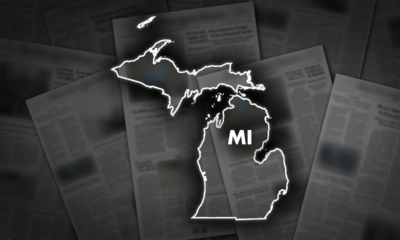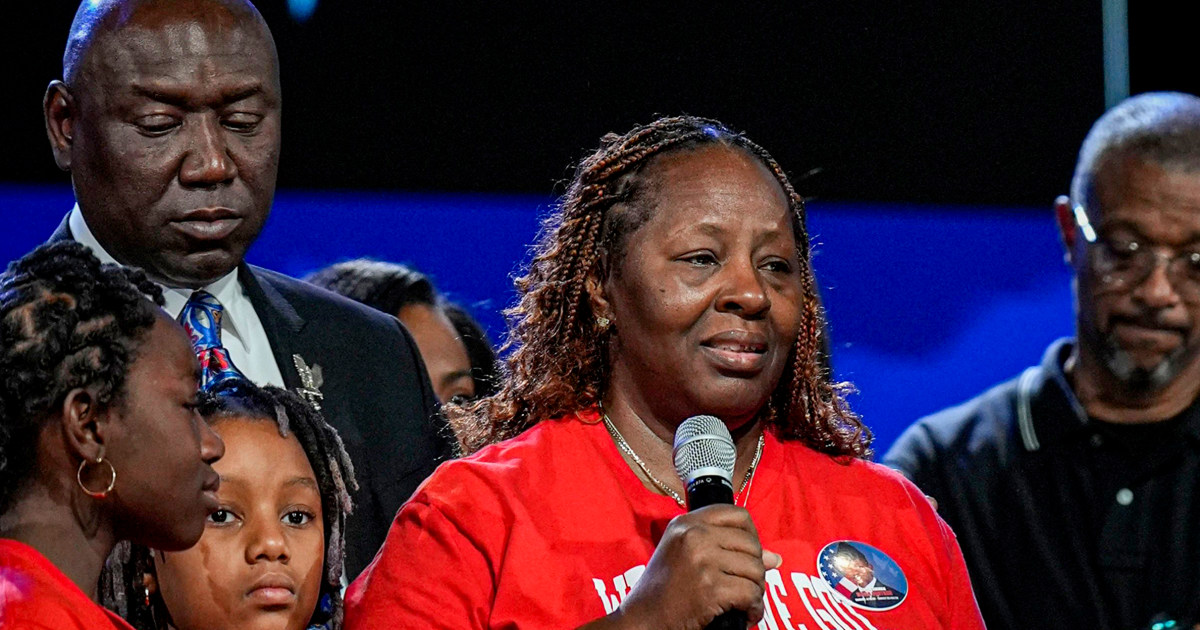Politics
Taking on the F.B.I., Trump Allies Single Out a Former Agent

Over 25 years as an F.B.I. agent, Timothy R. Thibault reeled in big names while investigating public corruption, sending two Democratic congressmen to prison and overseeing sensitive inquiries into the Clinton Foundation and the former governor of Virginia, Terry McAuliffe, another Democrat.
But now as Republicans and allies of former President Donald J. Trump work to undermine federal investigations into the former president, they have trained their sights on the little-known Mr. Thibault, who played a role in opening the Justice Department’s criminal inquiry into Mr. Trump’s efforts to reverse his 2020 election loss. In their casting, Mr. Thibault, who retired last year, is the face of bias and misconduct at the bureau.
Powerful Republican lawmakers, including Representative Jim Jordan and Senator Charles R. Grassley, demanded that Mr. Thibault testify before their committees. Citing an anonymous G.O.P. official, Mr. Jordan’s panel in a news release last year denounced Mr. Thibault as “public enemy No. 1.”
But his story is more complicated than Republicans have made it out to be. As an investigator working on high-profile public corruption cases and international terrorism, he was well regarded, eventually rising to one of the most senior positions in the bureau’s Washington field office and winning internal awards for his professionalism.
But, in an atmosphere in which Republicans have been seeking evidence of anti-conservative bias within the F.B.I., he opened the door to intense scrutiny of his record. Republicans have cited several social media posts — including one that seemed to align him with critics of Mr. Trump — and his handling of a number of cases that touched on claims by Mr. Trump about election fraud and wrongdoing by the Biden family.
A number of current and former F.B.I. agents are siding with the Republicans in seeking to show bias inside the bureau. Some have even joined Mr. Jordan’s committee, including two former counterintelligence agents.
Another former agent — who now works for a conservative think tank and sought to solicit information from a right-wing author with links to a former White House strategist for Mr. Trump — appears to have leveled complaints against Mr. Thibault that Mr. Grassley has seized on.
The scrutiny of Mr. Thibault has its roots in his management of a public corruption squad that became mired in conflict, including over investigating Hunter Biden, another focus of inquiry by Republicans on Capitol Hill.
Mr. Thibault was thrust into the harsh spotlight of politics in May 2022, when Mr. Grassley released a letter addressed to the F.B.I. that accused him of partisanship.
The letter laid out his activity on social media, which included expressing support for articles critical of Attorney General William P. Barr and reposting an article in The Atlantic titled, “Donald Trump Is a Broken Man.” Mr. Grassley also accused Mr. Thibault of an anti-Catholic post on Twitter about pedophiles. (Mr. Thibault, responding to a Catholic priest denouncing abortion, wrote in his post, “Focus on the pedophiles.” Mr. Thibault’s friends say that he was raised Catholic.)
Mr. Thibault, his friends and former colleagues say, was an outstanding investigator who is not partisan but knows he displayed poor judgment on social media.
Mr. Thibault worked on many cases involving both parties, his former colleagues said. He was the primary agent who successfully investigated former Representative William J. Jefferson, a New Orleans Democrat, and Jesse L. Jackson Jr., a former Democratic congressman from Illinois. Both were convicted.
Former colleagues have also repeatedly acknowledged his work. In 2006, Mr. Thibault received an annual award recognizing “professional excellence” and “sterling character.” He also earned the attorney general’s award for distinguished service for his role in Mr. Jefferson’s case.
Mr. Thibault’s lawyer did not respond to emails seeking comment, but his lawyer’s firm provided a statement last year after Republicans singled out Mr. Thibault.
“He firmly believes that any investigation will conclude that his supervision, leadership and decision making were not impacted by political bias or partisanship of any kind,” the statement said.
The Office of Special Counsel is investigating whether Mr. Thibault’s posts violated the Hatch Act, which prohibits federal employees from engaging in political activities while on the job.
The F.B.I. declined to comment. Mr. Thibault could not be reached for comment.
After focusing on international terrorism from 2018 to 2020, Mr. Thibault returned as a top agent, handling criminal matters at the F.B.I.’s Washington field office.
There he clashed with three agents who served on a public corruption squad that fell under his supervision at an F.B.I. office in Manassas in Northern Virginia. Even before Mr. Thibault’s return, the members of the squad had been warned by their supervisor that because of previous troublesome comments by the agents, partisanship was unacceptable.
Under Mr. Thibault, the squad appears to have fractured over how to handle politically fraught cases.
In one instance, he rejected a request to open an investigation into whether Italian satellites had been used to alter votes in favor of President Biden, a conspiracy theory that Mr. Trump peddled, two former law enforcement officials said.
The Justice Department under Mr. Trump also believed the theory was baseless. When the White House pressed the department to investigate, the acting deputy attorney general, Richard P. Donoghue, derided it as “pure insanity.”
Mr. Thibault was also connected to another incident that has drawn attention from Republicans.
Before the election, two agents contacted Peter Schweizer, who is the president of the Government Accountability Institute, which has received millions of dollars from prominent conservative donors. Mr. Schweizer also writes for Breitbart, a right-wing news outlet, and has ties to Stephen K. Bannon, a former White House strategist for Mr. Trump.
In an interview, Mr. Schweizer confirmed that the two sought information about Hunter Biden, the president’s son, whose foreign business dealings have been the subject of intense Republican scrutiny for years.
Mr. Schweizer had recently published a book, “Profiles in Corruption: Abuse of Power by America’s Progressive Elite,” delving into the financial dealings of the Biden family. The agents, Mr. Schweizer said, wanted to know if he could share documents related to Hunter Biden’s foreign business ties that he might have gathered for his work. Mr. Schweizer said he passed on corporate records and other files.
After The New York Post reported on the younger Mr. Biden’s laptop in October 2020, Mr. Schweizer said he informed the F.B.I. agents that he had a copy of the laptop’s contents, which were circulating in right-wing circles. But even though the agents had expressed interest, Mr. Schweizer said they never followed up, and in the end, “I never sent anything to them.”
The relationship “ended abruptly without any explanation,” he added.
The two agents’ outreach to Mr. Schweizer caused tension among the F.B.I. officials in Delaware running the case, who had seized the laptop in late 2019 using a grand jury subpoena, the former officials said.
At least one of the agents was instructed by Mr. Thibault to shut down that line of inquiry because of concerns that Mr. Thibault had received in a classified briefing about the possibility of the laptop containing disinformation, one of the former law enforcement officials said.
In a news release, Mr. Grassley accused Mr. Thibault of “improper conduct” in the investigation into Hunter Biden. Mr. Trump, for his part, lashed out on social media, claiming Mr. Thibault had been involved in “hiding and suppressing from the Public and the Media” the “Laptop from Hell,” before the 2020 election.
In his May 2022 letter to the F.B.I., Mr. Grassley tied Mr. Thibault to Bruce Ohr, a former Justice Department official, and his wife, Nellie Ohr, who were portrayed by Trump supporters as pro-Democratic conspiracy theorists out to destroy Mr. Trump. The three attended a seminar overseas in February 2016. One of the former law enforcement officials said Mr. Thibault did not know the couple.
A person familiar with the matter said one of the agents involved in the outreach to Mr. Schweizer, Thomas Olohan, had drafted a lengthy memo accusing Mr. Thibault of being biased against Mr. Trump. In the memo, Mr. Olohan suggested that the fact that Mr. Thibault and the Ohrs had attended the same seminar was evidence of bias on the part of Mr. Thibault.
The men had clashed after Mr. Thibault learned that Mr. Olohan’s daughter — who reports for The Daily Signal, a news site run by the conservative Heritage Foundation — had been writing about someone her father was investigating, two former law enforcement officials said. After Mr. Thibault took him off that case, Mr. Olohan transferred to another criminal squad before retiring last year.
Mr. Trump and his allies have vigorously attacked the F.B.I.’s reasons for opening the Russia investigation, trying to undermine its legitimacy.
And now Mr. Grassley has accused Mr. Thibault of improperly opening an investigation into Mr. Trump and his campaign. Mr. Thibault drafted a memo last spring that began the inquiry into efforts to create slates of electors pledged to Mr. Trump in states he had lost in 2020, according to the former law enforcement officials.
But under a policy established by Mr. Barr’s Justice Department in the months before the 2020 election, top F.B.I. and Justice Department officials need to sign off on the memo before investigating any candidate. The rule was meant to avoid influencing the outcome of the race.
Charlie Savage, Luke Broadwater and Jo Becker contributed reporting. Kitty Bennett contributed research.

Politics
Alaska lawmakers end their session with late bills passing on energy, education

Alaska lawmakers ended their four-month session early Thursday with a flurry of last-minute bills addressing priority issues such as energy and correspondence school programs that are a focus of ongoing litigation.
Bickering over the budget was muted compared with prior years, and Republican Gov. Mike Dunleavy and legislative leaders claimed successes in a session that was not without drama, marked by twofailed attempts to override Dunleavy vetoes of additional public school funding.
ALASKA LAWMAKERS FAIL TO OVERRIDE OF GOV. DUNLEAVY’S VETO OF EDUCATION PACKAGE
EDUCATION
Education was billed as a top priority, and lawmakers in the bipartisan-led Senate and Republican-led House overwhelmingly passed a compromise package that included a permanent $175 million increase in aid to districts through a school funding formula. But Dunleavy, who had sought charter school provisions and a three-year teacher bonus experiment that divided lawmakers, vetoed the measure.
A veto override attempt failed, along with efforts in the House to cobble together another package. Ultimately, lawmakers settled for pieces including a one-time, $175 million boost to the foundation formula in the budget and additional funding intended to help K-3 students with reading.
Last year, Dunleavy vetoed half of a one-time, $175 million boost to schools but has signaled willingness to support the increase in the just-passed budget.
Sen. Löki Tobin, a Democrat who chairs the Senate Education Committee, said work remained to address issues facing public schools, which “are still going to be struggling” because the funding approved is inadequate. School officials and education advocates had pushed for a roughly $360 million permanent increase in funding.
Tom Klaameyer, president of NEA-Alaska, a teachers’ union, said the Legislature’s failure to reinstate a pension offering for public employees also was disheartening. A pension bill narrowly passed the Senate but stalled in the House. Senate leaders said work would continue around retirement issues.
Late in session, lawmakers pivoted to correspondence schools, which allow for students to be homeschooled under the authority of school districts. That focus came after a judge found that laws around correspondence school allotments “were drafted with the express purpose of allowing purchases of private educational services with the public correspondence student allotments.” Under the state constitution, public funds cannot be paid “for the direct benefit of any religious or other private educational institution.”
Lawmakers passed a bill with provisions aimed at providing stability for correspondence students while the litigation plays out.
“The idea was to be able to give some peace and calm to the people out there, the 22,000 students, who weren’t sure what was going to happen,” House Speaker Cathy Tilton, a Republican, told reporters early Thursday.
UNDERGROUND CARBON STORAGE
The second of two bills proposed by Dunleavy as a way to capitalize on interest by companies with carbon emission reduction goals passed, allowing the state to establish a system and protocols for underground storage of carbon dioxide, with an eye toward using pore space in aging gas or oil fields, such as Cook Inlet or on the North Slope.
Lawmakers last year passed Dunleavy’s bill allowing the state to set up carbon sequestration projects or to lease state lands to a third party wanting to develop a carbon project. Draft regulations for the offsets program were released in March.
Dunleavy previously pitched the bills as a novel means for Alaska to generate perhaps billions of dollars in new revenue while still embracing fossil fuel production and other resource extraction, such as timber harvests and coal production. But the revenue impact of the proposals remains speculative.
To pay for government, the state relies heavily on oil revenue and earnings from its nest-egg, an oil-wealth fund that has grown through investments. Lawmakers have been reluctant to raise taxes on industries, like oil, and Alaska, with about 737,000 residents, has no statewide sales or personal income taxes.
Rebecca Noblin is the policy justice director with the group Native Movement. In written testimony this month on the underground carbon storage bill, she said the measure “would allow oil and gas companies and coal plants to inject carbon from their operations back into the ground” and will “increase pollution, cost the state money and distract from real solutions to climate change.”
ENERGY
The carbon bill, HB50, also included a provision supporters said could encourage more gas production in Cook Inlet. So-called reserve-based lending would allow for the issuance of loans made against and secured by an oil and gas field, proven reserves or other assets of the borrower. Under the bill, loans could be made by the Alaska Industrial Development and Export Authority, a state corporation, for projects it deems necessary to bolster production.
Residents in Alaska’s most populous region rely on gas from the aging Cook Inlet basin. But gas availability has become a concern and was a focal point this session. In February, Luke Saugier, senior vice president for Hilcorp Alaska, told lawmakers that while the company is “not pulling back” on investments in Cook Inlet and is committed to developing its leases, gas under its lease holdings can’t meet all the region’s gas demand. He said other sources of energy are needed.
Sen. Bill Wielechowski, an Anchorage Democrat, said the lending provision could unlock gas fields and end up being “one of the most important things that we have done this year.”
Dunleavy’s office also applauded passage of a separate measure that it says would streamline tax and tariff policies “to make new and existing electrical generation projects more affordable.”
“That in turn incentivizes independent power producers to move forward on renewable power projects like solar and wind farms along the Railbelt,” his office said in a statement.
DIVIDEND
The size of the annual dividend paid to residents has often been one of the major points of contention, contributing to drawn-out or special sessions. But there was little pushback this year, with lawmakers agreeing to a dividend of roughly $1,360 and an energy relief payment of $295.
Legislative leaders pointed to better communication and a balancing of priorities, including what Republican Rep. DeLena Johnson, a House Finance co-chair, called a “solid” state infrastructure budget.
Politics
Newsom administration unveils new $20-billion cost estimate for delta water tunnel
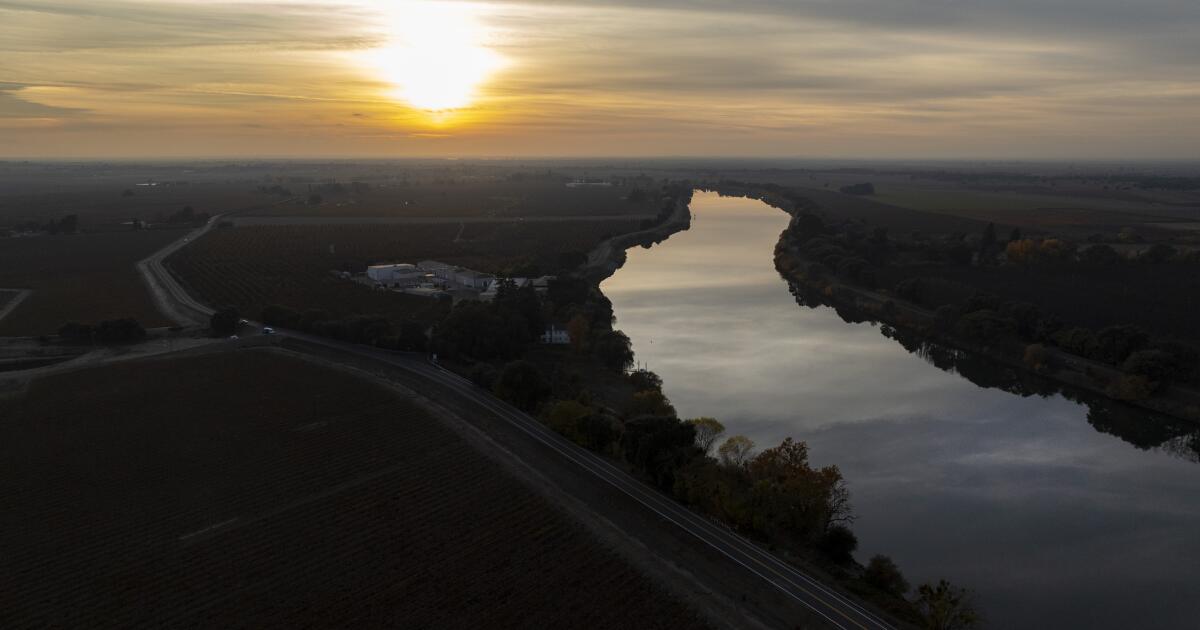
Gov. Gavin Newsom’s administration announced that the estimated cost of building a tunnel to transport water beneath the Sacramento-San Joaquin River Delta has risen to $20.1 billion.
The estimate is part of a new cost-benefit analysis by the California Department of Water Resources, which concluded that the projected benefits of constructing the water tunnel would far outweigh the costs.
State officials released the analysis Thursday, saying the proposed Delta Conveyance Project is vital to improving the reliability of water supplies in the face of climate change, sea level rise and the risks of an earthquake that could put existing infrastructure out of commission for months.
The state estimates that the project’s benefits would total nearly $38 billion by offsetting steep reductions in water deliveries due to existing infrastructure limitations and climate change.
A gull flies above McLeod Lake in Stockton.
(Brian van der Brug/Los Angeles Times)
“The project easily passes a benefit-cost test,” said David Sunding, a UC Berkeley emeritus professor who led the analysis as a consultant for the state. “The benefits clearly justify the costs.”
The last time the state produced an estimate, in 2020, the price tag came to $16 billion. The cost increase, Sunding said, is almost entirely due to inflation. The projected benefits also increased.
The cost analysis is the state’s latest step toward building the 45-mile tunnel, which would create a second route to draw water from the Sacramento River into the aqueducts of the State Water Project.
Newsom says the project is critical for California’s future, but opponents argue it is a costly boondoggle that would harm the delta and further imperil its ecosystem.
Environmental groups, Indigenous tribes, fishing organizations and local agencies have filed lawsuits seeking to block the project.
This week, dozens of groups filed protests with the State Water Resources Control Board challenging a state petition to change its “point of diversion” in the delta — one of the steps necessary to move forward with construction.
The State Water Project supplies 27 million people and about 750,000 acres of farmland — fueling a $2.3-trillion portion of the state’s economy.
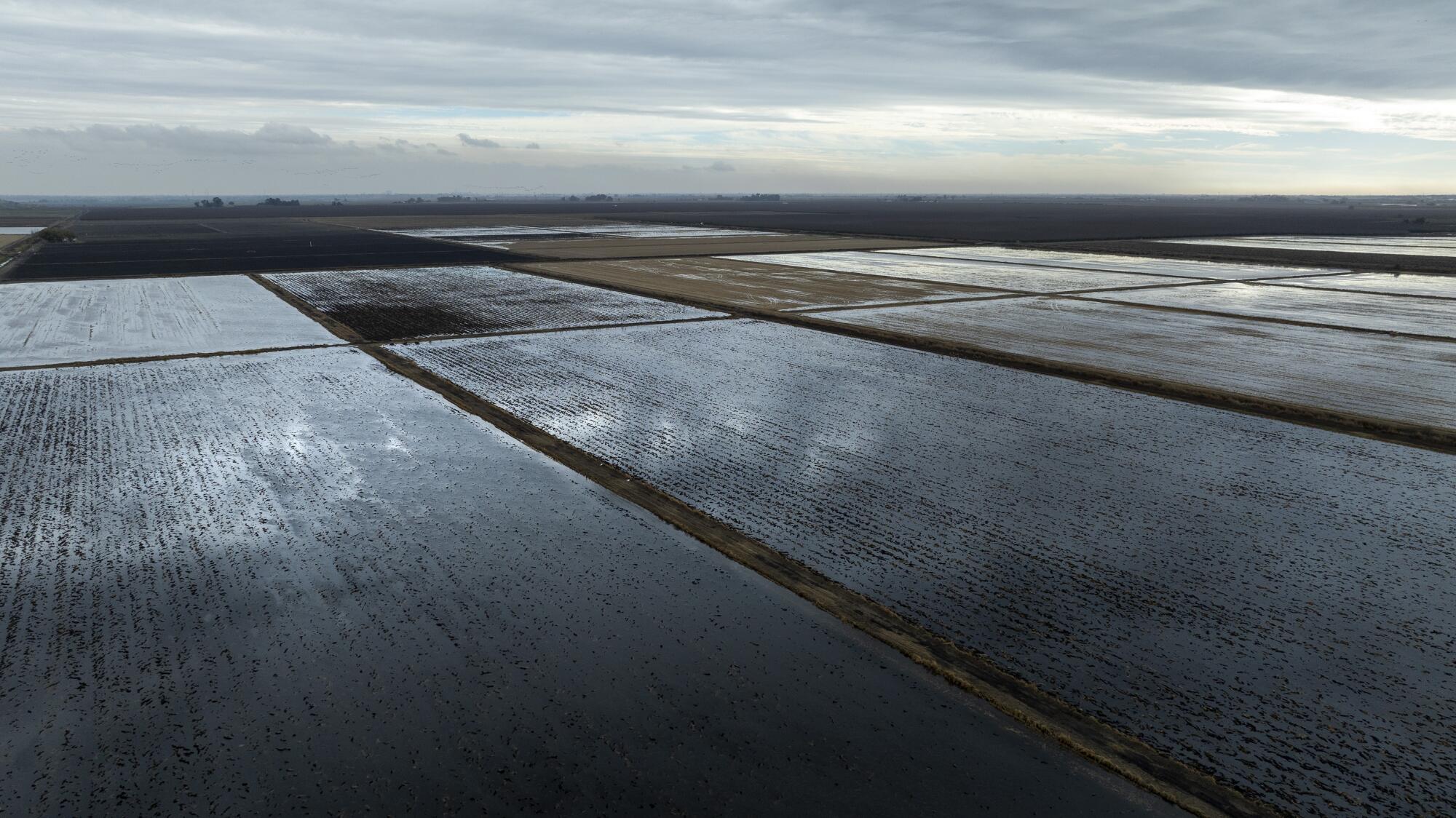
Flooded rice fields along the San Joaquin River in Stockton.
(Brian van der Brug/Los Angeles Times)
But state officials say the state’s existing pumping infrastructure in the south delta, which draws water into the California Aqueduct, is vulnerable to the more intense extremes driven by climate change, as well as sea level rise.

Aggressive and impactful reporting on climate change, the environment, health and science.
They estimate that if the state relies on its current infrastructure, there would likely be a 22% reduction in water deliveries by 2070. However, construction of the tunnel would boost supplies by an estimated 400,000 acre-feet annually, compared to the “no project” alternative.
The estimates included an analysis of impacts from sea level rise — using scenarios of a 1.8 feet or 3.5 feet rise by 2070 — which would bring increasing risks of delta levees failing or being overtopped, and higher salinity water encroaching on existing infrastructure.
State officials also analyzed the risk that a major earthquake would pose to the existing infrastructure, which they say could disrupt deliveries of supplies for months. Sunding said the tunnel would have a “superior ability” to withstand earthquakes and would make the state’s system less vulnerable.

A sign of opposition to the Delta Conveyance Project along a levee road near the Sacramento River in Hood.
(Brian van der Brug/Los Angeles Times)
“I get a lump in my throat when I look at the potential for a catastrophic failure in the delta,” said Karla Nemeth, director of the state Department of Water Resources. “This is a project that just provides enormous value to the broad California economy.”
Nemeth said the analysis shows that doing nothing would mean substantial costs for the state through frequent water shortages, mandatory restrictions in cities, and reductions in agricultural supplies that would force farmers to leave fields dry and fallow.
“It is vastly more efficient and economical to avoid declining supplies,” Nemeth said.
The costs of the project would be paid for by urban and agricultural water districts that decide to participate.
The state’s cost-benefit analysis is intended to provide information that local water agencies, such as the Metropolitan Water District of Southern California, will consider.
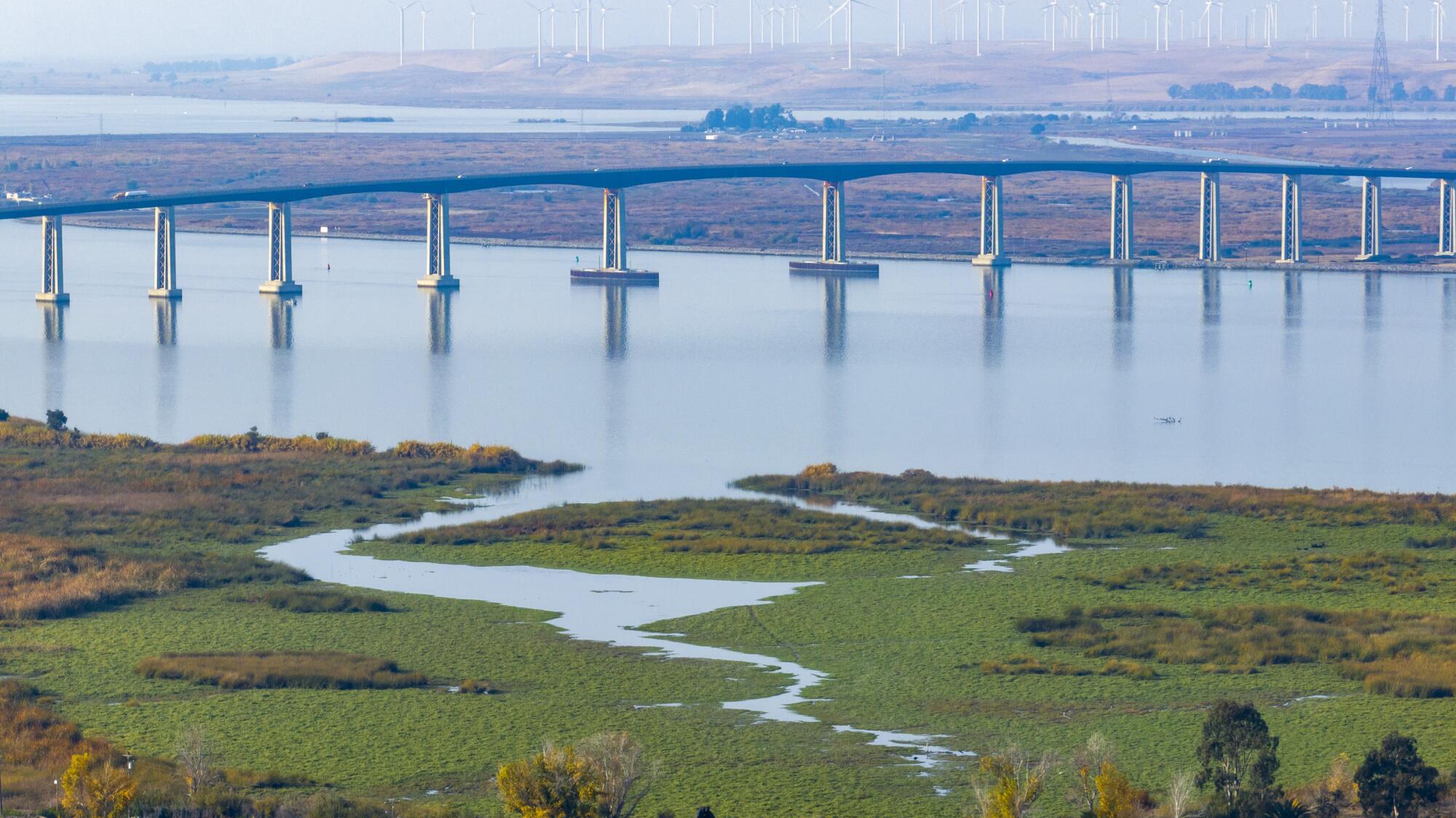
The Antioch Bridge over the San Joaquin River.
(Brian van der Brug/Los Angeles Times)
In preparing the updated cost estimate, the Delta Conveyance Design and Construction Authority examined potential “design and construction innovations” that could reduce the overall costs by about $1.2 billion.
Currently, about 56% of water deliveries from the State Water Project supply urban areas, while nearly 44% go to agriculture.
The analysis projects that with the tunnel, California would have fewer periods of mandatory water rationing and also less severe rationing, Sunding said. The project “helps to preserve the supplies that would otherwise be eroded through climate change,” he said.
State officials also compared the costs of additional supplies from the tunnel, at $1,325 per acre-foot, to the costs of additional supplies through investments in desalination, wastewater recycling, stormwater capture and conservation.
Sunding said they found the median costs of these other types of investments would be higher, with the exception of conservation, which is “in the same ballpark” with the project.
“But it is important to note that we’ve done a lot of water conservation in the state, particularly in Southern California and some parts of the Bay Area, and a lot of the cheapest water conservation projects have already been done,” Sunding said. “So there are limits to how much more water conservation there can be.”
However, other experts say California still has a great deal of potential to continue reducing water use through conservation. Researchers with the Pacific Institute, a water think tank, found in a 2022 study that the state could reduce water use by more than 30% in cities and suburbs by investing in measures to use water more efficiently.
Opponents of the tunnel project have argued the state should instead invest in other approaches in the delta, such as shoring up levees and restoring natural floodplains to reduce flood risks, while changing water management to protect the estuary’s health.
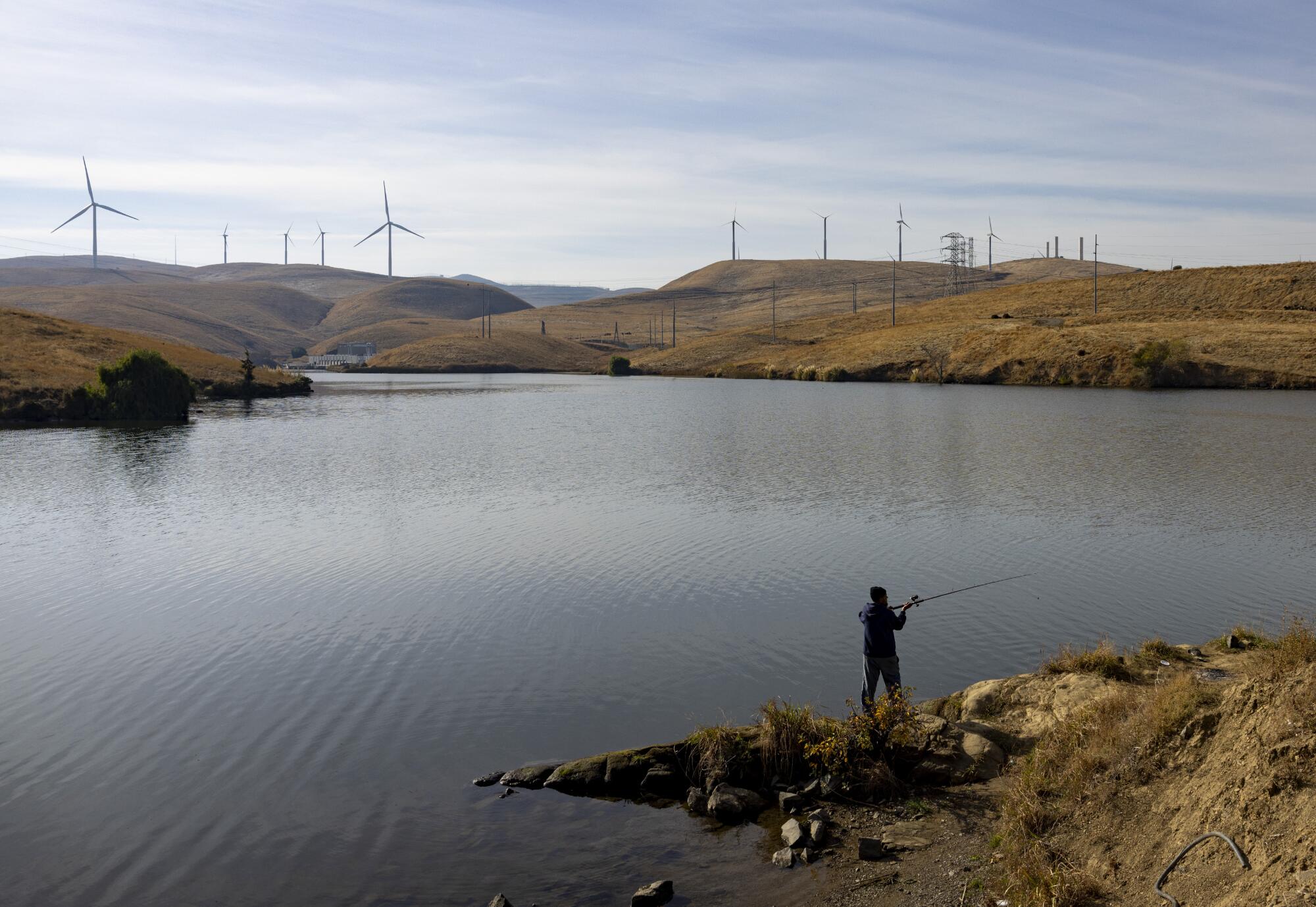
An angler casts into Bethany Reservoir in Byron.
(Brian van der Brug/Los Angeles Times)
Fish populations have suffered declines in recent years, and environmentalists say the tunnel would cause additional ecological harm.
State officials say the tunnel would lessen limitations on water deliveries linked to fish protections at the state’s existing pumping facilities in the south delta.
They point to this year as an example. Despite a wet winter and ample river flows, a rise in the deaths of steelhead trout and other fish in areas around the pumps forced reductions in pumping.
The Department of Water Resources said that if the delta tunnel had been in operation this year, an additional 909,000 acre-feet of water could have been delivered from intakes in the north delta, helping to resolve what officials described as “difficult conflicts” in the south delta.
“The status quo is not an option going forward. It’s just not something that can be maintained,” Sunding said. “One way or another, the system is going to change. Climate change is going to have its impact.”
Politics
Illegal immigrants from foreign adversary hit new high amid national security fears: 'Extremely alarming'

A record-breaking number of Chinese nationals have illegally crossed the border nationwide so far this fiscal year, figures released this week show, an increase of nearly 8,000% since FY 2021.
Customs and Border Protection updated its encounter numbers for April, showing that now there have been 27,583 encounters of Chinese nationals by Border Patrol this fiscal year, which began in October.
That is compared to 24,125 in all of FY 2023, 1,987 in FY 2022 and just 342 in FY 2021.
ILLEGAL MIGRANTS FROM THIS FOREIGN ADVERSARY ARE INCREASINGLY CROSSING THE BORDER
Migrants in line in Jacumba, California. Border authorities are contending with an influx of Chinese migrants in a key border sector. (Robert Gauthier/Los Angeles Times via Getty Images)
This means there has been a 7,965% increase from FY 2021 in numbers of Chinese crossing illegally. Of the 27,583 so far this FY 2024, 23,622, or 85%, were single adults.
More than 90% of the crossings this FY 2024 have been in the San Diego sector. There have also been more than 1,200 encounters in the first eight days of May, an average of more than 150 a day.
Republicans and some border officials have raised concerns about the potential for espionage, as well as the smuggling of drugs like fentanyl. Republicans on a House Homeland Security subcommittee are holding a hearing Thursday on the matter, called, “Security Risk: The unprecedented surge in Chinese illegal immigration.”
Democrats dismissed that hearing, calling it on their website, “Another Republican border ‘hearing’ with invasion rhetoric and fearmongering.”
SOUTHERN BORDER MIGRANT ENCOUNTERS DECREASE SLIGHTLY BUT GOTAWAYS STILL SURGE UNDER BIDEN

A Chinese migrant speaks to a border patrol officer before being processed after crossing the Rio Grande into the U.S. (Brandon Bell)
A committee spokesperson told Fox News Digital this week that the minority expects Republicans to use the hearing to “employ hyperbolic and xenophobic rhetoric to scaremonger about a ‘foreign invasion’ at the border.”
“But the facts show that changes to Chinese migration reflect deteriorating economic and political conditions in China, and broader shifts in global migration patterns,” they said. “Responding to those shifts requires congressional action, including bipartisan legislation and additional funding for border security – which Republicans consistently oppose or block.”
Republicans on the committee described the dismissiveness as “disappointing.”
“It’s sad that House Democrats’ response to this hearing sounds more like Chinese state media than anything else,” Subcommittee on Oversight, Investigations, and Accountability Chairman Dan Bishop told Fox News Digital.
“This fiscal year, apprehensions of Chinese nationals by Border Patrol agents at our Southwest border already exceed those from fiscal years 2007 – 2020 combined,” he said. “It should be extremely alarming to everyone, regardless of party, when record numbers of individuals from an adversarial nation flood into our country without vetting or oversight. House Democrats are clearly uninterested in combating this national security threat, which is disappointing — but not surprising.”
Overall, the numbers of migrant encounters in April declined slightly. There were 179,725 encounters across the southern border in April, compared to 211,992 in April 2023 and 189,357 in March.
-

 Politics1 week ago
Politics1 week agoBiden takes role as bystander on border and campus protests, surrenders the bully pulpit
-

 Politics1 week ago
Politics1 week ago'You need to stop': Gov. Noem lashes out during heated interview over book anecdote about killing dog
-

 News1 week ago
News1 week agoMan, 75, confesses to killing wife in hospital because he couldn’t afford her care, court documents say
-

 Politics1 week ago
Politics1 week agoRFK Jr said a worm ate part of his brain and died in his head
-

 World1 week ago
World1 week agoPentagon chief confirms US pause on weapons shipment to Israel
-

 Politics1 week ago
Politics1 week agoHere's what GOP rebels want from Johnson amid threats to oust him from speakership
-

 World1 week ago
World1 week agoPro-Palestine protests: How some universities reached deals with students
-

 World1 week ago
World1 week agoConvicted MEP's expense claims must be published: EU court


